MST124 TMA 02: Essential Mathematics 1 - Covers Units 3, 4, 5 and 6
VerifiedAdded on 2023/01/11
|13
|1572
|75
Homework Assignment
AI Summary
This document presents a comprehensive solution to the MST124 TMA 02 assignment, focusing on essential mathematical concepts. The solution addresses several key areas, including solving inequalities and quadratic equations, completing the square, and graphing quadratic functions. It also covers trigonometry, including finding solutions to trigonometric equations, applying the cosine rule to solve triangles, and evaluating trigonometric functions using trigonometric identities. Furthermore, the document delves into circle and ellipse equations, determining points of intersection and radii. It also tackles vector and calculus problems, including finding resultant velocities, acceleration, and stationary points of functions. The solutions are detailed, step-by-step, and adhere to good mathematical style, providing a valuable resource for students studying essential mathematics.

Mathematics
Paraphrase This Document
Need a fresh take? Get an instant paraphrase of this document with our AI Paraphraser

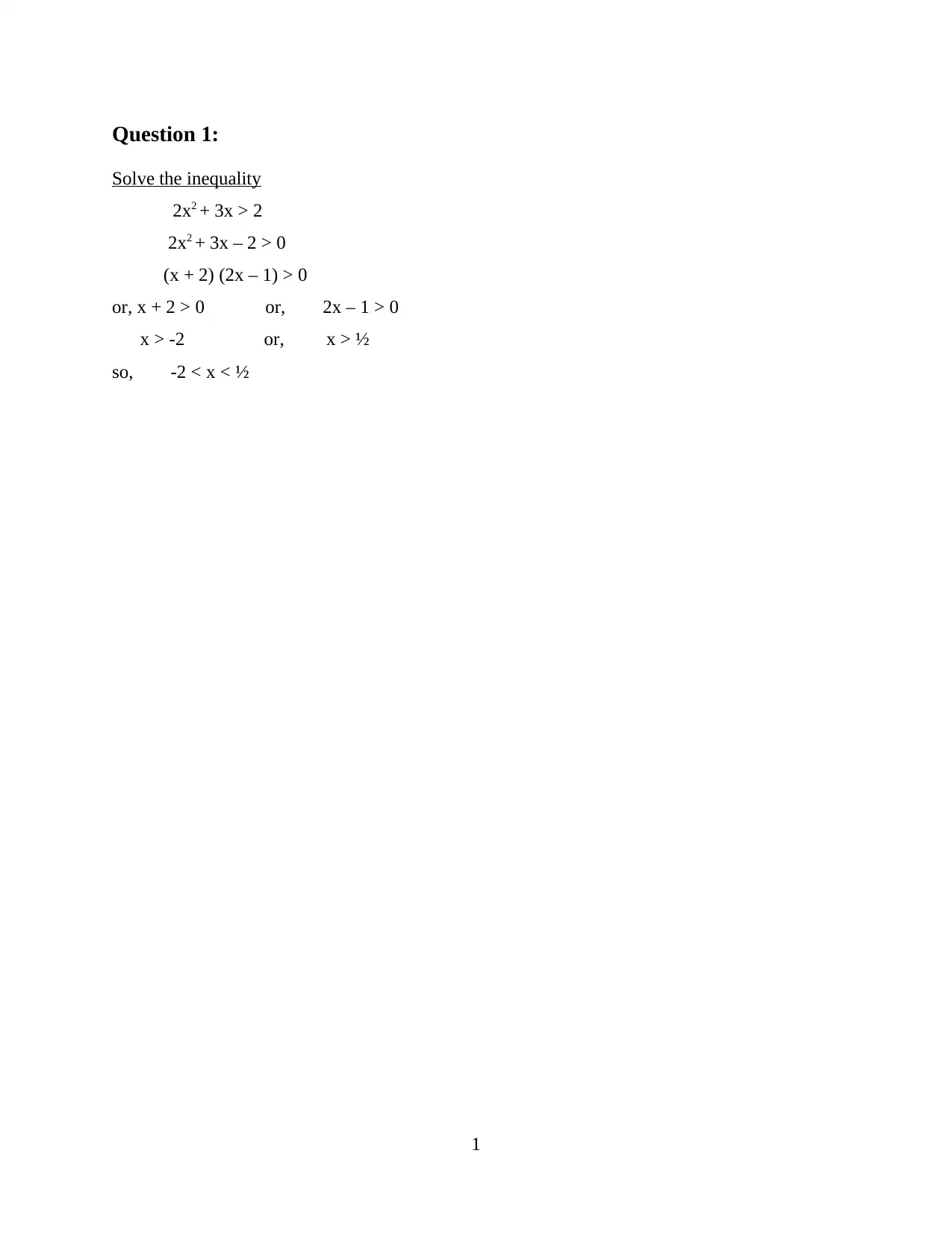
Question 1:
Solve the inequality
2x2 + 3x > 2
2x2 + 3x – 2 > 0
(x + 2) (2x – 1) > 0
or, x + 2 > 0 or, 2x – 1 > 0
x > -2 or, x > ½
so, -2 < x < ½
1
Solve the inequality
2x2 + 3x > 2
2x2 + 3x – 2 > 0
(x + 2) (2x – 1) > 0
or, x + 2 > 0 or, 2x – 1 > 0
x > -2 or, x > ½
so, -2 < x < ½
1
⊘ This is a preview!⊘
Do you want full access?
Subscribe today to unlock all pages.

Trusted by 1+ million students worldwide
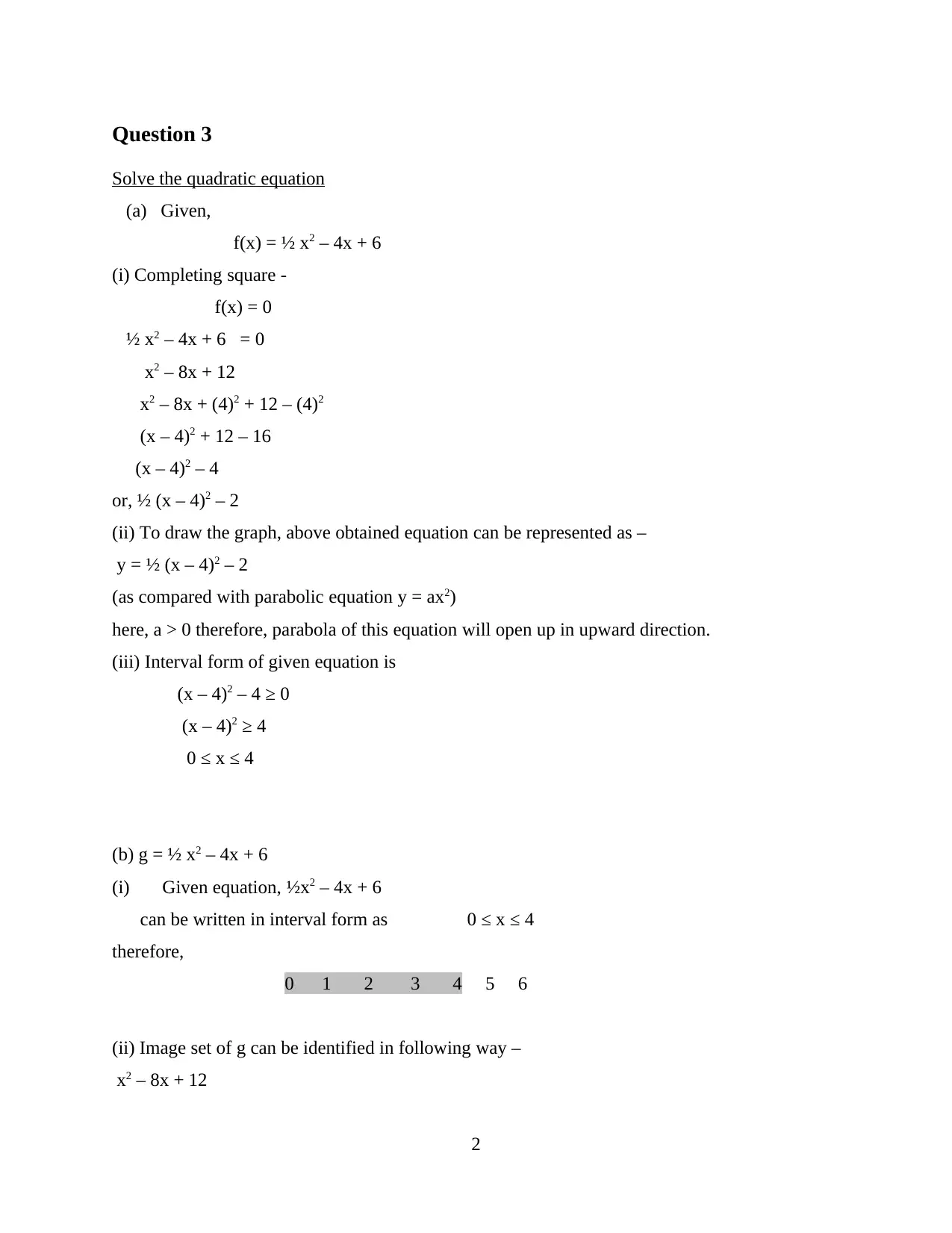
Question 3
Solve the quadratic equation
(a) Given,
f(x) = ½ x2 – 4x + 6
(i) Completing square -
f(x) = 0
½ x2 – 4x + 6 = 0
x2 – 8x + 12
x2 – 8x + (4)2 + 12 – (4)2
(x – 4)2 + 12 – 16
(x – 4)2 – 4
or, ½ (x – 4)2 – 2
(ii) To draw the graph, above obtained equation can be represented as –
y = ½ (x – 4)2 – 2
(as compared with parabolic equation y = ax2)
here, a > 0 therefore, parabola of this equation will open up in upward direction.
(iii) Interval form of given equation is
(x – 4)2 – 4 ≥ 0
(x – 4)2 ≥ 4
0 ≤ x ≤ 4
(b) g = ½ x2 – 4x + 6
(i) Given equation, ½x2 – 4x + 6
can be written in interval form as 0 ≤ x ≤ 4
therefore,
0 1 2 3 4 5 6
(ii) Image set of g can be identified in following way –
x2 – 8x + 12
2
Solve the quadratic equation
(a) Given,
f(x) = ½ x2 – 4x + 6
(i) Completing square -
f(x) = 0
½ x2 – 4x + 6 = 0
x2 – 8x + 12
x2 – 8x + (4)2 + 12 – (4)2
(x – 4)2 + 12 – 16
(x – 4)2 – 4
or, ½ (x – 4)2 – 2
(ii) To draw the graph, above obtained equation can be represented as –
y = ½ (x – 4)2 – 2
(as compared with parabolic equation y = ax2)
here, a > 0 therefore, parabola of this equation will open up in upward direction.
(iii) Interval form of given equation is
(x – 4)2 – 4 ≥ 0
(x – 4)2 ≥ 4
0 ≤ x ≤ 4
(b) g = ½ x2 – 4x + 6
(i) Given equation, ½x2 – 4x + 6
can be written in interval form as 0 ≤ x ≤ 4
therefore,
0 1 2 3 4 5 6
(ii) Image set of g can be identified in following way –
x2 – 8x + 12
2
Paraphrase This Document
Need a fresh take? Get an instant paraphrase of this document with our AI Paraphraser
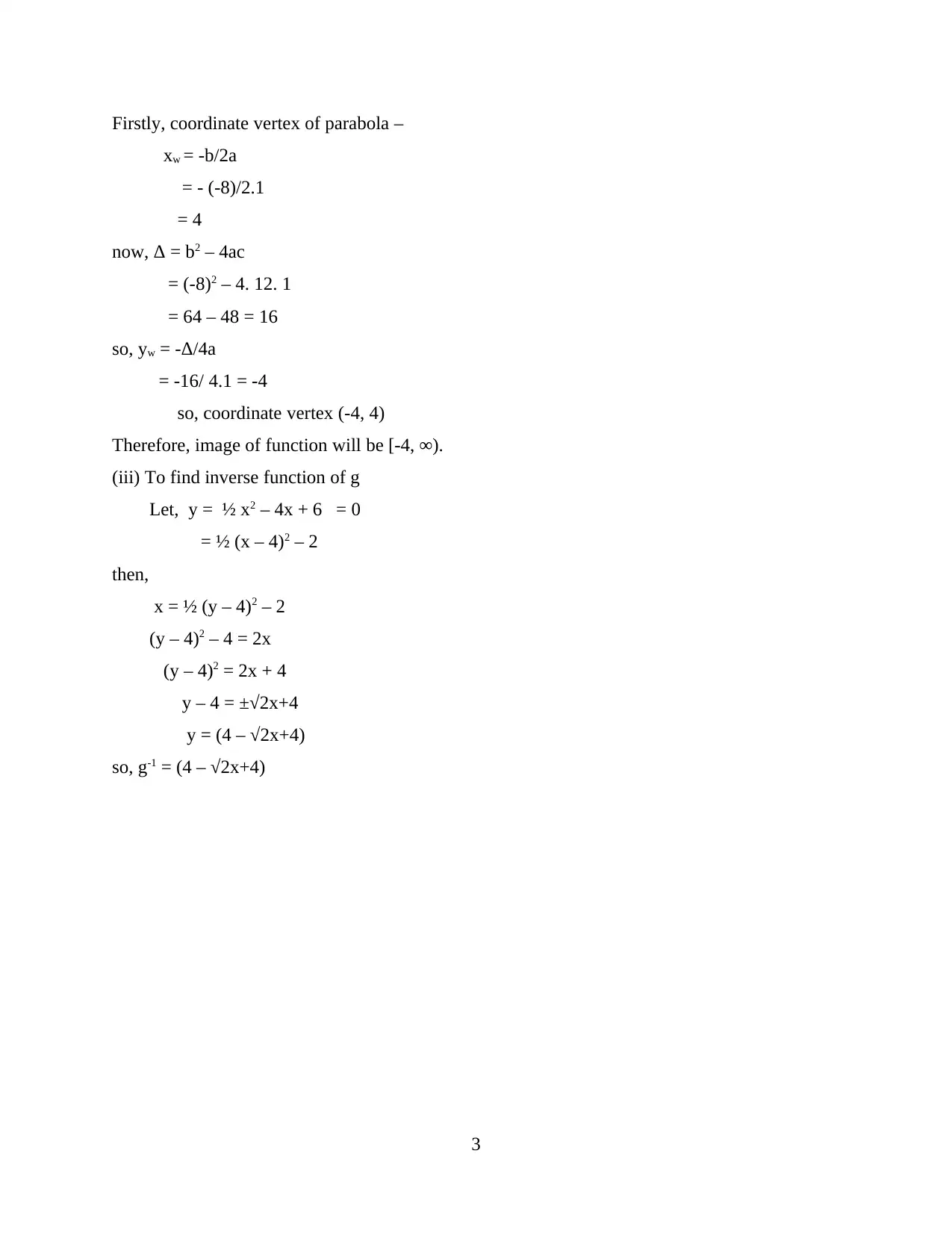
Firstly, coordinate vertex of parabola –
xw = -b/2a
= - (-8)/2.1
= 4
now, Δ = b2 – 4ac
= (-8)2 – 4. 12. 1
= 64 – 48 = 16
so, yw = -Δ/4a
= -16/ 4.1 = -4
so, coordinate vertex (-4, 4)
Therefore, image of function will be [-4, ∞).
(iii) To find inverse function of g
Let, y = ½ x2 – 4x + 6 = 0
= ½ (x – 4)2 – 2
then,
x = ½ (y – 4)2 – 2
(y – 4)2 – 4 = 2x
(y – 4)2 = 2x + 4
y – 4 = ±√2x+4
y = (4 – √2x+4)
so, g-1 = (4 – √2x+4)
3
xw = -b/2a
= - (-8)/2.1
= 4
now, Δ = b2 – 4ac
= (-8)2 – 4. 12. 1
= 64 – 48 = 16
so, yw = -Δ/4a
= -16/ 4.1 = -4
so, coordinate vertex (-4, 4)
Therefore, image of function will be [-4, ∞).
(iii) To find inverse function of g
Let, y = ½ x2 – 4x + 6 = 0
= ½ (x – 4)2 – 2
then,
x = ½ (y – 4)2 – 2
(y – 4)2 – 4 = 2x
(y – 4)2 = 2x + 4
y – 4 = ±√2x+4
y = (4 – √2x+4)
so, g-1 = (4 – √2x+4)
3
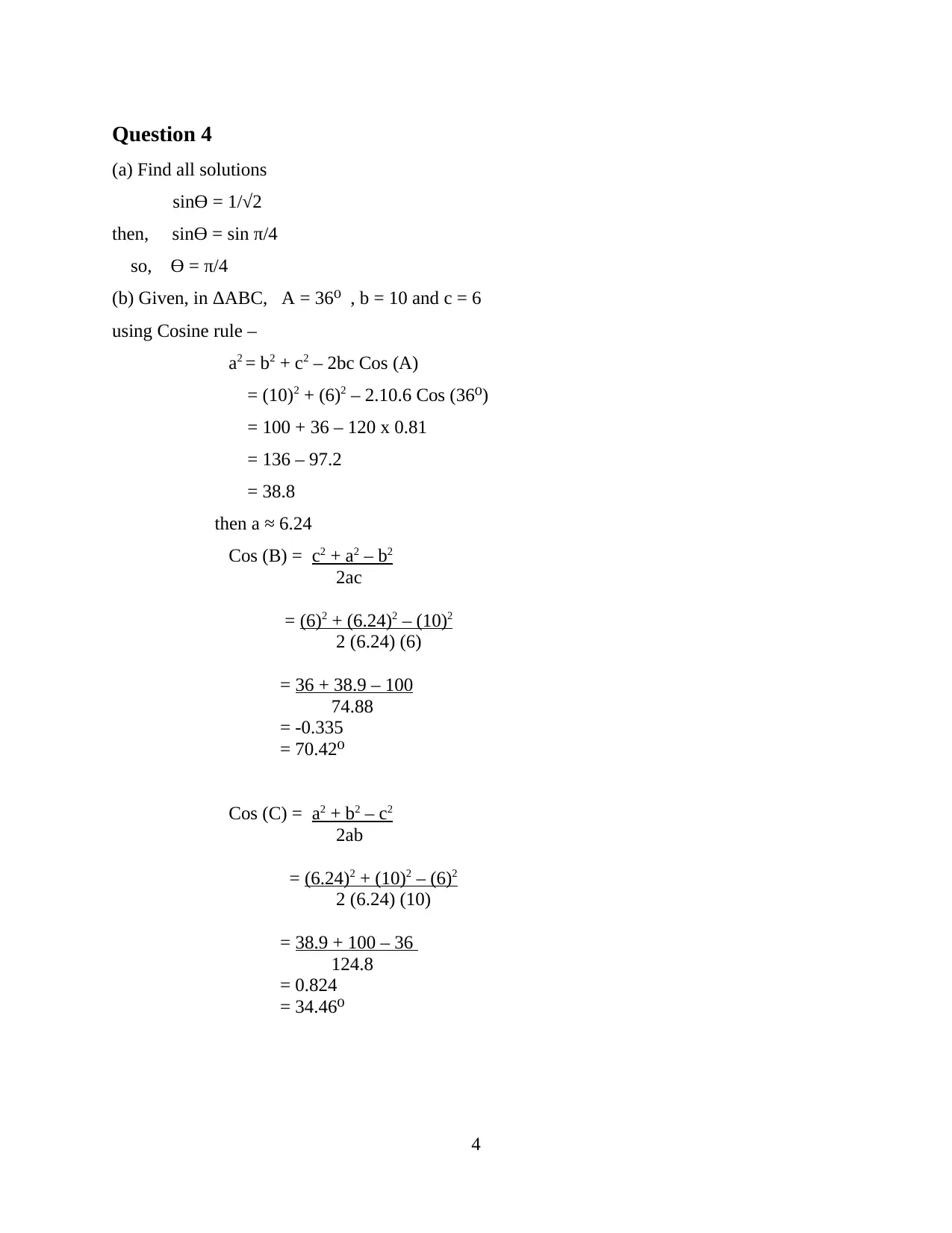
Question 4
(a) Find all solutions
sinϴ = 1/√2
then, sinϴ = sin π/4
so, ϴ = π/4
(b) Given, in ΔABC, A = 36 , b = 10 and c = 6⁰
using Cosine rule –
a2 = b2 + c2 – 2bc Cos (A)
= (10)2 + (6)2 – 2.10.6 Cos (36 )⁰
= 100 + 36 – 120 x 0.81
= 136 – 97.2
= 38.8
then a ≈ 6.24
Cos (B) = c2 + a2 – b2
2ac
= (6)2 + (6.24)2 – (10)2
2 (6.24) (6)
= 36 + 38.9 – 100
74.88
= -0.335
= 70.42⁰
Cos (C) = a2 + b2 – c2
2ab
= (6.24)2 + (10)2 – (6)2
2 (6.24) (10)
= 38.9 + 100 – 36
124.8
= 0.824
= 34.46⁰
4
(a) Find all solutions
sinϴ = 1/√2
then, sinϴ = sin π/4
so, ϴ = π/4
(b) Given, in ΔABC, A = 36 , b = 10 and c = 6⁰
using Cosine rule –
a2 = b2 + c2 – 2bc Cos (A)
= (10)2 + (6)2 – 2.10.6 Cos (36 )⁰
= 100 + 36 – 120 x 0.81
= 136 – 97.2
= 38.8
then a ≈ 6.24
Cos (B) = c2 + a2 – b2
2ac
= (6)2 + (6.24)2 – (10)2
2 (6.24) (6)
= 36 + 38.9 – 100
74.88
= -0.335
= 70.42⁰
Cos (C) = a2 + b2 – c2
2ab
= (6.24)2 + (10)2 – (6)2
2 (6.24) (10)
= 38.9 + 100 – 36
124.8
= 0.824
= 34.46⁰
4
⊘ This is a preview!⊘
Do you want full access?
Subscribe today to unlock all pages.

Trusted by 1+ million students worldwide
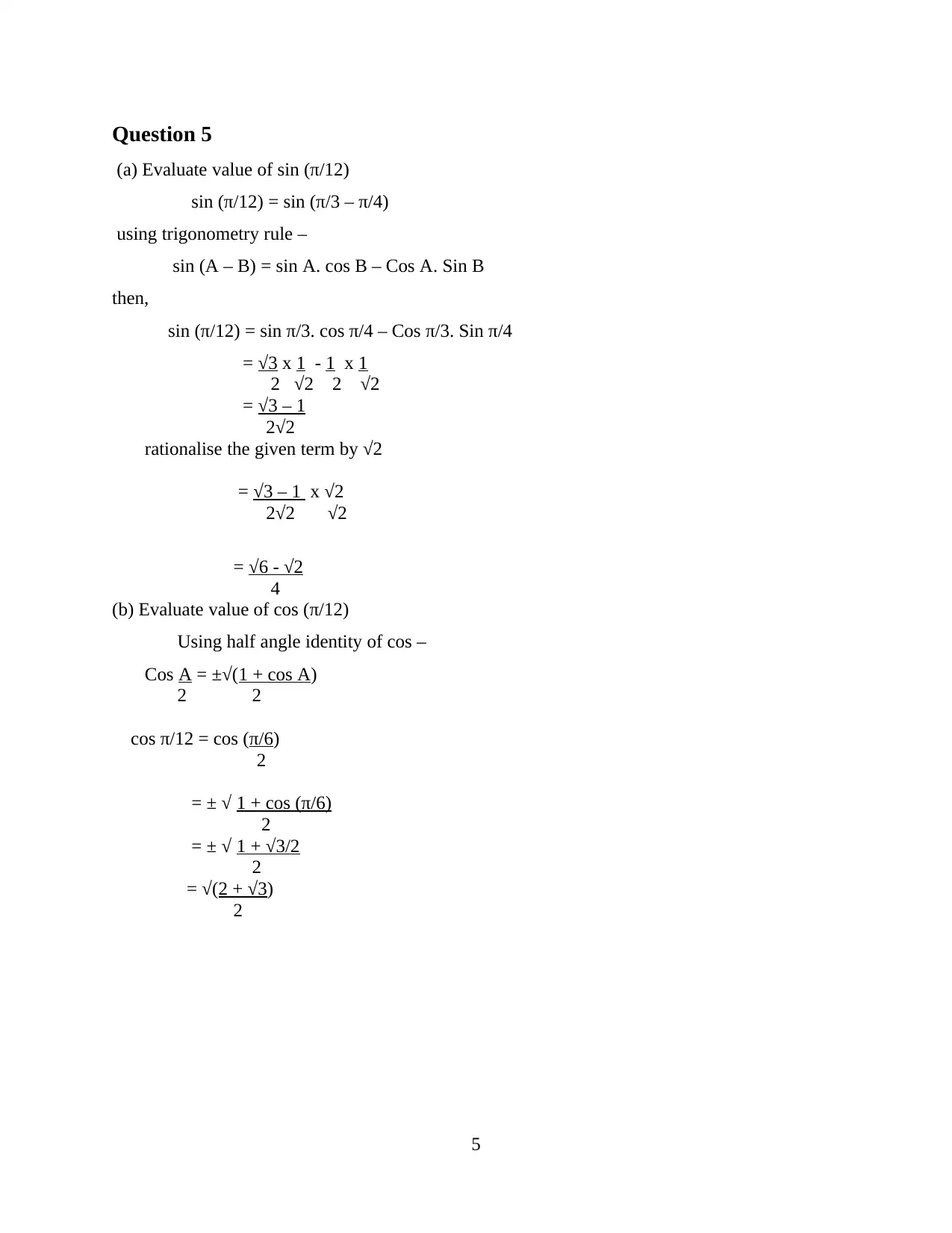
Question 5
(a) Evaluate value of sin (π/12)
sin (π/12) = sin (π/3 – π/4)
using trigonometry rule –
sin (A – B) = sin A. cos B – Cos A. Sin B
then,
sin (π/12) = sin π/3. cos π/4 – Cos π/3. Sin π/4
= √3 x 1 - 1 x 1
2 √2 2 √2
= √3 – 1
2√2
rationalise the given term by √2
= √3 – 1 x √2
2√2 √2
= √6 - √2
4
(b) Evaluate value of cos (π/12)
Using half angle identity of cos –
Cos A = ±√(1 + cos A)
2 2
cos π/12 = cos (π/6)
2
= ± √ 1 + cos (π/6)
2
= ± √ 1 + √3/2
2
= √(2 + √3)
2
5
(a) Evaluate value of sin (π/12)
sin (π/12) = sin (π/3 – π/4)
using trigonometry rule –
sin (A – B) = sin A. cos B – Cos A. Sin B
then,
sin (π/12) = sin π/3. cos π/4 – Cos π/3. Sin π/4
= √3 x 1 - 1 x 1
2 √2 2 √2
= √3 – 1
2√2
rationalise the given term by √2
= √3 – 1 x √2
2√2 √2
= √6 - √2
4
(b) Evaluate value of cos (π/12)
Using half angle identity of cos –
Cos A = ±√(1 + cos A)
2 2
cos π/12 = cos (π/6)
2
= ± √ 1 + cos (π/6)
2
= ± √ 1 + √3/2
2
= √(2 + √3)
2
5
Paraphrase This Document
Need a fresh take? Get an instant paraphrase of this document with our AI Paraphraser
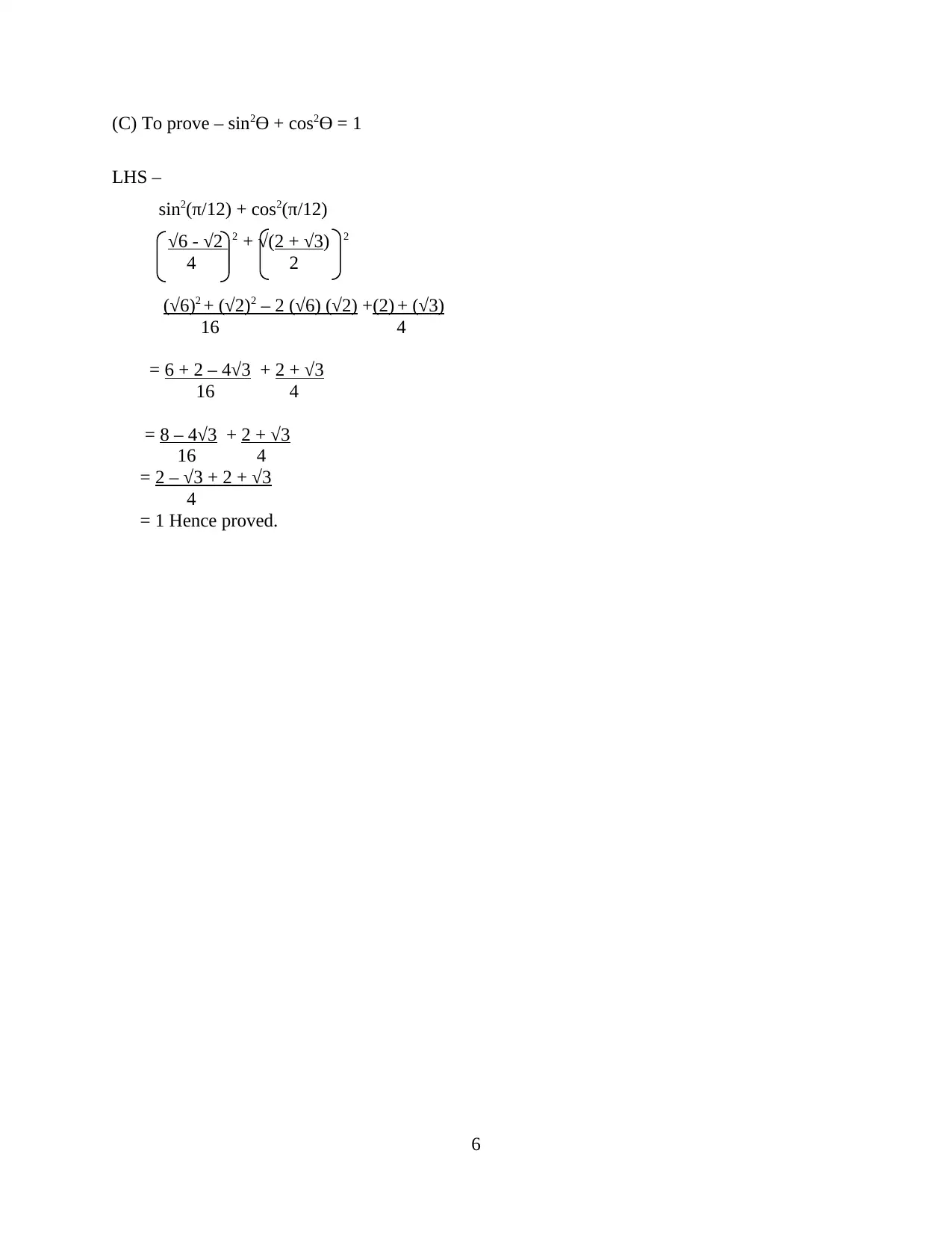
(C) To prove – sin2ϴ + cos2ϴ = 1
LHS –
sin2(π/12) + cos2(π/12)
√6 - √2 2 + √(2 + √3) 2
4 2
(√6)2 + (√2)2 – 2 (√6) (√2) +(2) + (√3)
16 4
= 6 + 2 – 4√3 + 2 + √3
16 4
= 8 – 4√3 + 2 + √3
16 4
= 2 – √3 + 2 + √3
4
= 1 Hence proved.
6
LHS –
sin2(π/12) + cos2(π/12)
√6 - √2 2 + √(2 + √3) 2
4 2
(√6)2 + (√2)2 – 2 (√6) (√2) +(2) + (√3)
16 4
= 6 + 2 – 4√3 + 2 + √3
16 4
= 8 – 4√3 + 2 + √3
16 4
= 2 – √3 + 2 + √3
4
= 1 Hence proved.
6
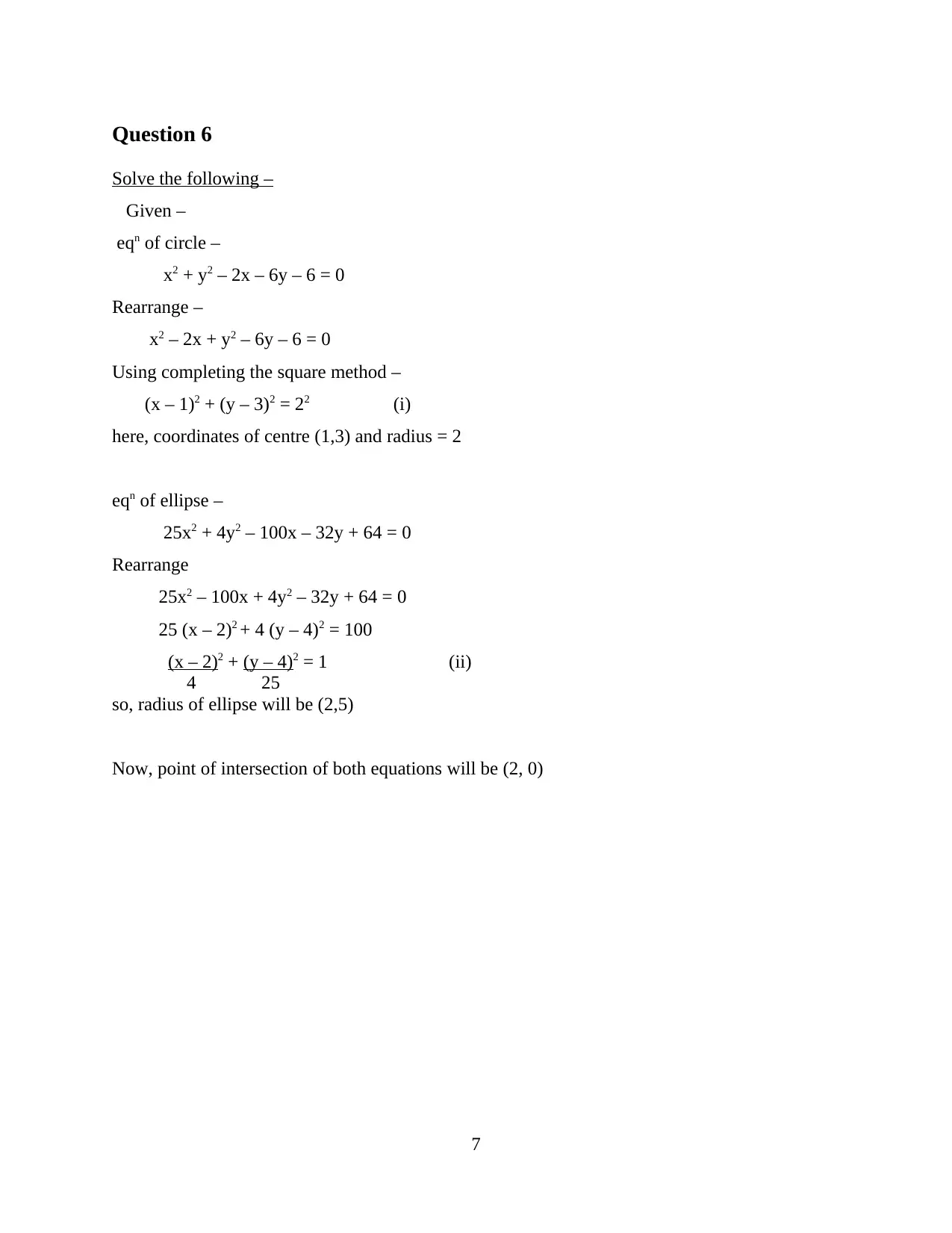
Question 6
Solve the following –
Given –
eqn of circle –
x2 + y2 – 2x – 6y – 6 = 0
Rearrange –
x2 – 2x + y2 – 6y – 6 = 0
Using completing the square method –
(x – 1)2 + (y – 3)2 = 22 (i)
here, coordinates of centre (1,3) and radius = 2
eqn of ellipse –
25x2 + 4y2 – 100x – 32y + 64 = 0
Rearrange
25x2 – 100x + 4y2 – 32y + 64 = 0
25 (x – 2)2 + 4 (y – 4)2 = 100
(x – 2)2 + (y – 4)2 = 1 (ii)
4 25
so, radius of ellipse will be (2,5)
Now, point of intersection of both equations will be (2, 0)
7
Solve the following –
Given –
eqn of circle –
x2 + y2 – 2x – 6y – 6 = 0
Rearrange –
x2 – 2x + y2 – 6y – 6 = 0
Using completing the square method –
(x – 1)2 + (y – 3)2 = 22 (i)
here, coordinates of centre (1,3) and radius = 2
eqn of ellipse –
25x2 + 4y2 – 100x – 32y + 64 = 0
Rearrange
25x2 – 100x + 4y2 – 32y + 64 = 0
25 (x – 2)2 + 4 (y – 4)2 = 100
(x – 2)2 + (y – 4)2 = 1 (ii)
4 25
so, radius of ellipse will be (2,5)
Now, point of intersection of both equations will be (2, 0)
7
⊘ This is a preview!⊘
Do you want full access?
Subscribe today to unlock all pages.

Trusted by 1+ million students worldwide
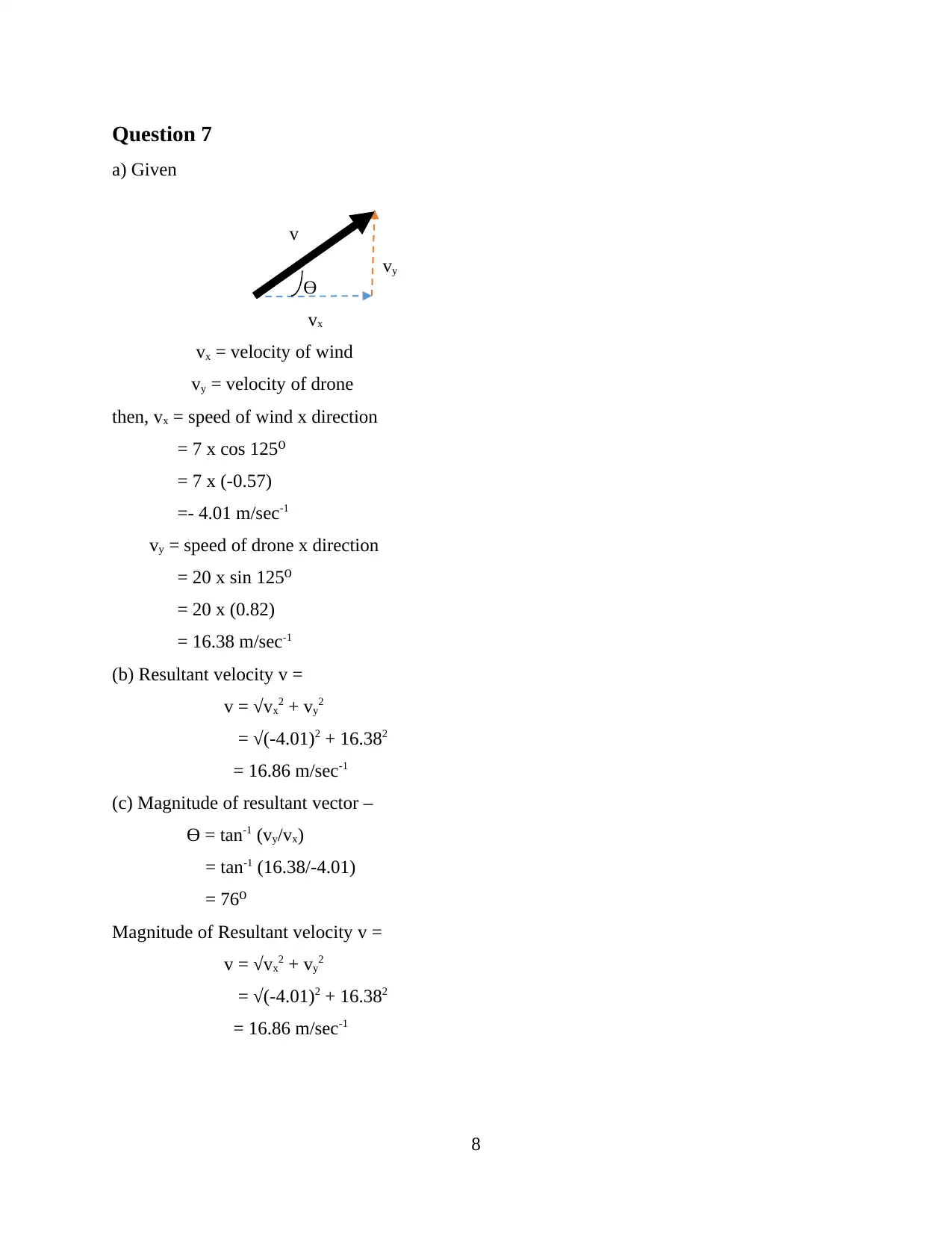
Question 7
a) Given
v
vy
ϴ
vx
vx = velocity of wind
vy = velocity of drone
then, vx = speed of wind x direction
= 7 x cos 125⁰
= 7 x (-0.57)
=- 4.01 m/sec-1
vy = speed of drone x direction
= 20 x sin 125⁰
= 20 x (0.82)
= 16.38 m/sec-1
(b) Resultant velocity v =
v = √vx2 + vy2
= √(-4.01)2 + 16.382
= 16.86 m/sec-1
(c) Magnitude of resultant vector –
ϴ = tan-1 (vy/vx)
= tan-1 (16.38/-4.01)
= 76⁰
Magnitude of Resultant velocity v =
v = √vx2 + vy2
= √(-4.01)2 + 16.382
= 16.86 m/sec-1
8
a) Given
v
vy
ϴ
vx
vx = velocity of wind
vy = velocity of drone
then, vx = speed of wind x direction
= 7 x cos 125⁰
= 7 x (-0.57)
=- 4.01 m/sec-1
vy = speed of drone x direction
= 20 x sin 125⁰
= 20 x (0.82)
= 16.38 m/sec-1
(b) Resultant velocity v =
v = √vx2 + vy2
= √(-4.01)2 + 16.382
= 16.86 m/sec-1
(c) Magnitude of resultant vector –
ϴ = tan-1 (vy/vx)
= tan-1 (16.38/-4.01)
= 76⁰
Magnitude of Resultant velocity v =
v = √vx2 + vy2
= √(-4.01)2 + 16.382
= 16.86 m/sec-1
8
Paraphrase This Document
Need a fresh take? Get an instant paraphrase of this document with our AI Paraphraser
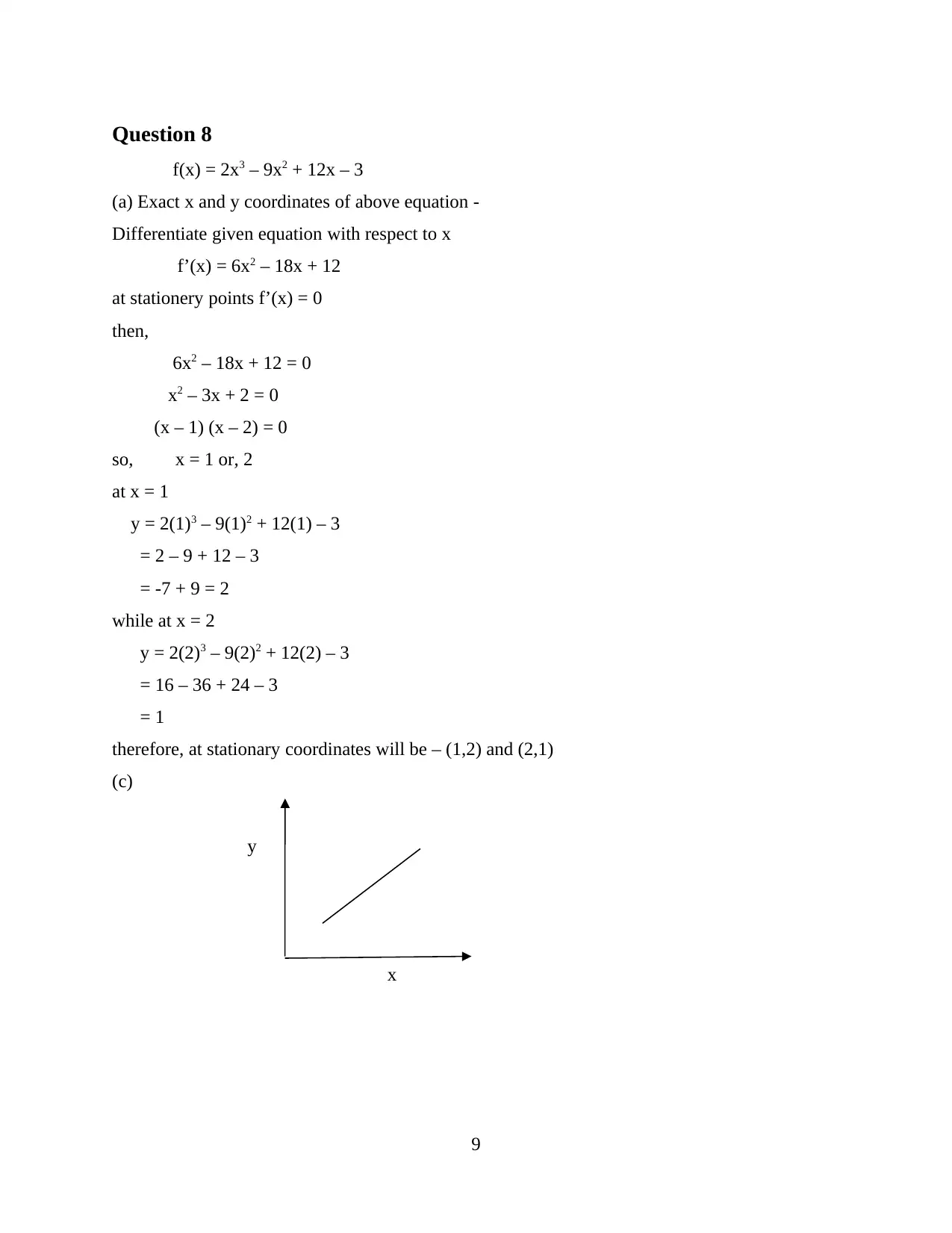
Question 8
f(x) = 2x3 – 9x2 + 12x – 3
(a) Exact x and y coordinates of above equation -
Differentiate given equation with respect to x
f’(x) = 6x2 – 18x + 12
at stationery points f’(x) = 0
then,
6x2 – 18x + 12 = 0
x2 – 3x + 2 = 0
(x – 1) (x – 2) = 0
so, x = 1 or, 2
at x = 1
y = 2(1)3 – 9(1)2 + 12(1) – 3
= 2 – 9 + 12 – 3
= -7 + 9 = 2
while at x = 2
y = 2(2)3 – 9(2)2 + 12(2) – 3
= 16 – 36 + 24 – 3
= 1
therefore, at stationary coordinates will be – (1,2) and (2,1)
(c)
y
x
9
f(x) = 2x3 – 9x2 + 12x – 3
(a) Exact x and y coordinates of above equation -
Differentiate given equation with respect to x
f’(x) = 6x2 – 18x + 12
at stationery points f’(x) = 0
then,
6x2 – 18x + 12 = 0
x2 – 3x + 2 = 0
(x – 1) (x – 2) = 0
so, x = 1 or, 2
at x = 1
y = 2(1)3 – 9(1)2 + 12(1) – 3
= 2 – 9 + 12 – 3
= -7 + 9 = 2
while at x = 2
y = 2(2)3 – 9(2)2 + 12(2) – 3
= 16 – 36 + 24 – 3
= 1
therefore, at stationary coordinates will be – (1,2) and (2,1)
(c)
y
x
9
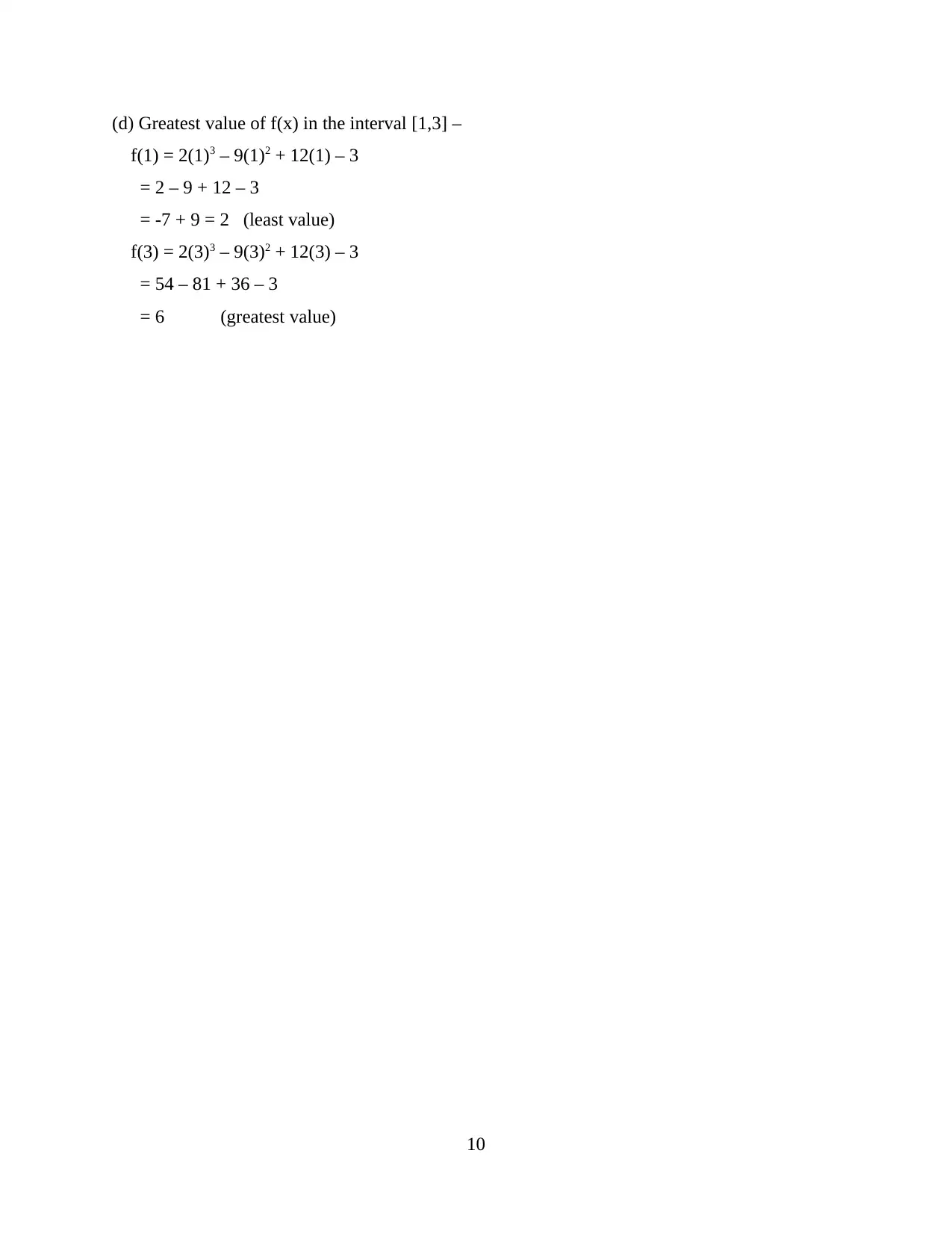
(d) Greatest value of f(x) in the interval [1,3] –
f(1) = 2(1)3 – 9(1)2 + 12(1) – 3
= 2 – 9 + 12 – 3
= -7 + 9 = 2 (least value)
f(3) = 2(3)3 – 9(3)2 + 12(3) – 3
= 54 – 81 + 36 – 3
= 6 (greatest value)
10
f(1) = 2(1)3 – 9(1)2 + 12(1) – 3
= 2 – 9 + 12 – 3
= -7 + 9 = 2 (least value)
f(3) = 2(3)3 – 9(3)2 + 12(3) – 3
= 54 – 81 + 36 – 3
= 6 (greatest value)
10
⊘ This is a preview!⊘
Do you want full access?
Subscribe today to unlock all pages.

Trusted by 1+ million students worldwide
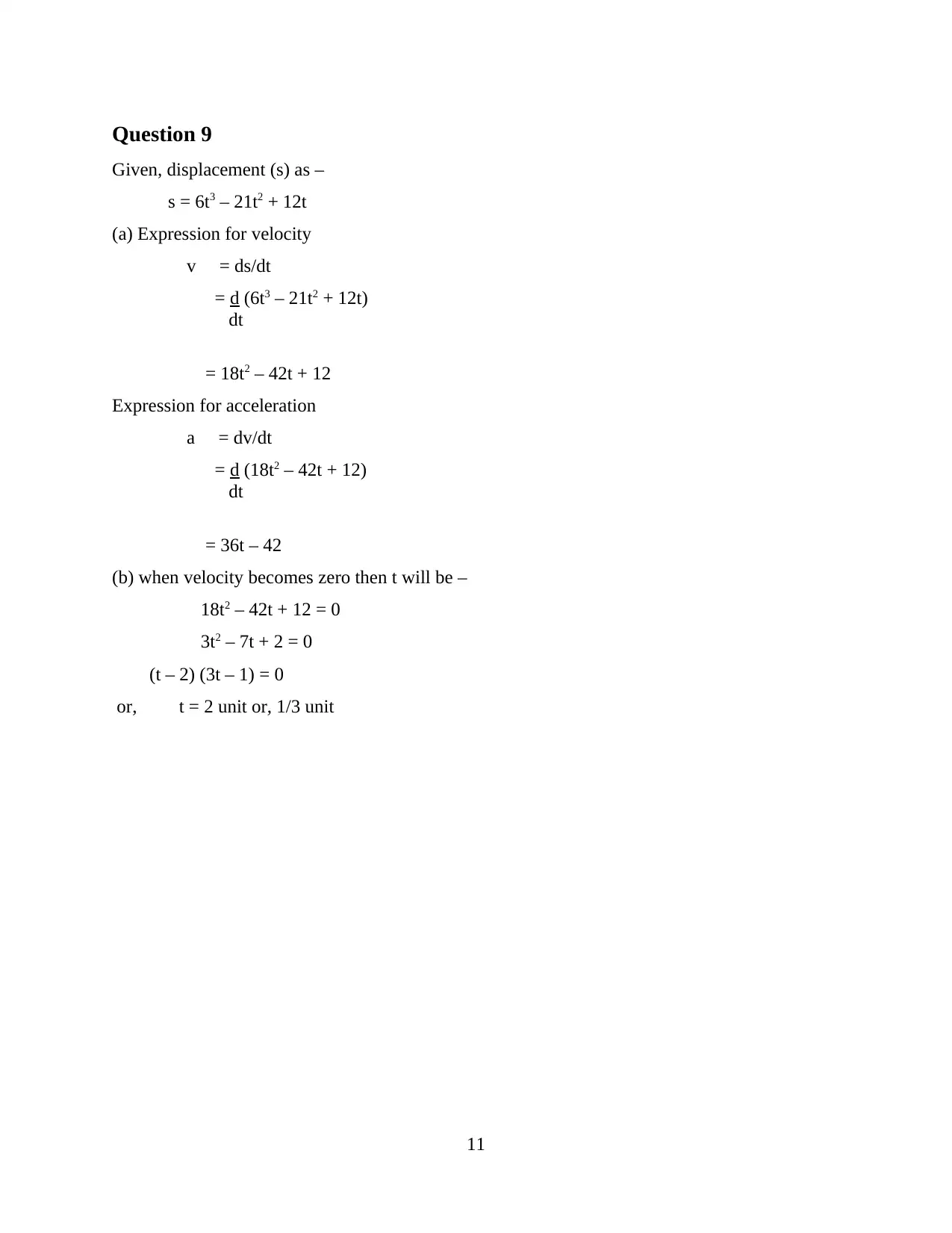
Question 9
Given, displacement (s) as –
s = 6t3 – 21t2 + 12t
(a) Expression for velocity
v = ds/dt
= d (6t3 – 21t2 + 12t)
dt
= 18t2 – 42t + 12
Expression for acceleration
a = dv/dt
= d (18t2 – 42t + 12)
dt
= 36t – 42
(b) when velocity becomes zero then t will be –
18t2 – 42t + 12 = 0
3t2 – 7t + 2 = 0
(t – 2) (3t – 1) = 0
or, t = 2 unit or, 1/3 unit
11
Given, displacement (s) as –
s = 6t3 – 21t2 + 12t
(a) Expression for velocity
v = ds/dt
= d (6t3 – 21t2 + 12t)
dt
= 18t2 – 42t + 12
Expression for acceleration
a = dv/dt
= d (18t2 – 42t + 12)
dt
= 36t – 42
(b) when velocity becomes zero then t will be –
18t2 – 42t + 12 = 0
3t2 – 7t + 2 = 0
(t – 2) (3t – 1) = 0
or, t = 2 unit or, 1/3 unit
11
1 out of 13
Related Documents
Your All-in-One AI-Powered Toolkit for Academic Success.
+13062052269
info@desklib.com
Available 24*7 on WhatsApp / Email
![[object Object]](/_next/static/media/star-bottom.7253800d.svg)
Unlock your academic potential
© 2024 | Zucol Services PVT LTD | All rights reserved.




